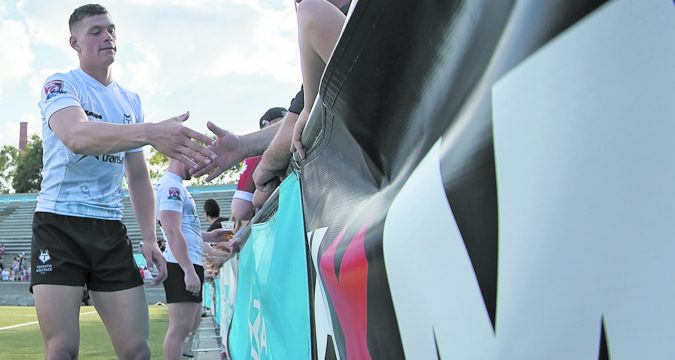
A lot has happened in the 18 months between Quinn Ngawati leaving and rejoining Toronto Wolfpack.
The club, of course, has earned promotion to Super League. You don’t have the scratch beneath the surface too much to discover the various trials, tribulations and dramas that have unfolded too.
Ngawati’s life hasn’t been uneventful either. At the end of 2018, he decided to leave the Wolfpack to pursue a career in aviation. Only, the lure of rugby was too high.
“When I moved back to Canada I had to an opportunity to train with both the Canada 7s and the 15s for the national programmes as well as starting to complete my pilot licence.
“But the demands of full-time training was just too much and I wanted to decide where I wanted my future to go, I thought I could see myself really enjoying the career that sport provided, so I left aviation behind and late last year I reached out and asked if there was an opportunity to come back and they were on board with the idea. I left the club on good terms.
“A few things had to be done in terms of dispensation with the RFL and the Canadian players fitting into the league, so I’ve just been continuing full-time training with the Nationals 7s team as well as the 15s Academy, but then everything got done and now I’m here.”
Ngawati’s arrival at Toronto is a result of the club receiving a dispensation for his signature. Initially, the Wolfpack had hoped to receive a 5% (£105,000) allowance, but it wasn’t granted. However, it was eventually agreed that they would be able to sign two Canadians under the age of 21.
As a result, they have turned to Ngawati, a 20-year-old who has played a grand total of 13 first-grade Rugby League matches, with eleven of those in League 1.
That will, inevitably, leave many questioning what good Ngawati will do for a side that has lost its first six Super League games, despite boasting talents such as Sonny Bill Williams and Ricky Leutele. A cynic may claim Toronto’s rival clubs had a similar line of thinking when granting the dispensation.
However, Ngawati believes he has improved as a player greatly during his time in Canada’s programmes, even though he has been training in two different codes.
“There’s a lot of crossover, maybe not as much in the contact side but in the amount of running and skills that we do. The importance of catching kick-offs in those two codes is massive, and in Rugby League, there are a lot of high kicks, so that’s one transferrable skill as an example.
“I’ve only been here a few days, I know a lot of the boys and you can tell everyone is optimistic and knowing the people who are still here, they are the ones who put in the hard work. I don’t think they have taken the start too harsh.”
Ngawati is something of a poster boy for the Wolfpack and North American expansion. Among the many, many criticisms aimed at Toronto has been their inability to enhance the player pool with their own talent. Ngawati, along with American Ryan Burroughs, are the first, and only, two Toronto have currently unearthed.
But Ngawati doesn’t expect to be the last. Far from it.
“The brand itself has grown a lot since they’ve got to Super League,” he said.
“A lot of people from the west coast of Canada, which is five hours on a plane, know who the Wolfpack are and there’s a lot of interest from potential players who are currently athletes in other sports. They want to make that jump.
“There are a lot of players that would fit the ideal of a Rugby League player. It’s just hard because by the time you’re at a pro-level now you’ve been picked up by another professional team in a different sport. But now more players will pursue a career in Rugby League, because they have seen what Rugby League is compared to a few years ago when they hadn’t, and they know there are going to be two professional Canadian clubs.
“In my time at Rugby Canada I’ve met players who have played lots of other sports, Canadian Football, sprinting, there are so many subtleties in the 15-man game that once you get to a level the little stuff becomes super hard to work on, but in Rugby League it’s the basics and it’s easy to use your personal strengths in the game.
“By the time most people watch a few games, they’re addicted; I think Toronto fans would testify to that too. I feel like Canadians are going to get hooked on the game and that will see more athletes pursue a career in the game moving forward.”
